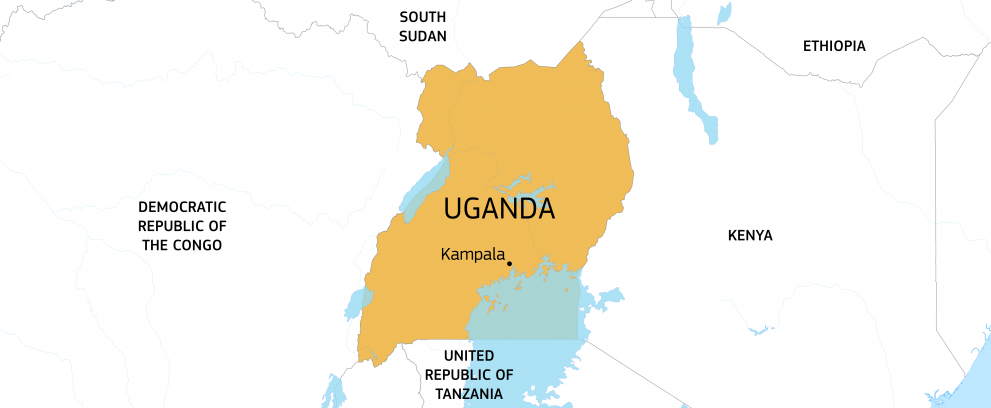Introduction
Uganda hosts over 1.7 million refugees and asylum seekers. This is the largest refugee population in Africa and the 6th largest in the world. Refugees mainly come from South Sudan (55%) and from the Democratic Republic of the Congo (31%). Uganda is constantly receiving new arrivals, with over 335,000 refugees arriving since January 2022.
Uganda is also impacted by the crisis in Sudan, with 54,000 new Sudanese refugees who arrived in Uganda since the conflict started. While Uganda is praised for its open-door policy, the constant influx of new arrivals is putting its progressive refugee policy under pressure.
The country is also vulnerable to natural hazards (such as floods, landslides, drought, hailstorms) and epidemics (such as cholera, Ebola, malaria, measles and more recently mpox). At the same time climate changes leads to more frequent and extreme weather events across the country.
What are the needs?
Life-saving humanitarian assistance to refugees is crucial to meet their basic and protection needs. 79% of refugees are women and children and 93% need food assistance. The diminishing funding for humanitarian assistance affects provision of assistance, such as food rations, core relief (or cash) packages for new arrivals, hygiene kits, medicines, and self-reliance projects.
This also strains the provision of public services (water, sanitation, hygiene, health, and education) in refugee settlements where provision of services currently is below national.
Negative coping mechanisms have emerged as a response to these funding cuts, which not only affect refugees but also have the potential to disrupt the peaceful coexistence between them and the host communities.

There are also needs to support Uganda’s efforts to better anticipate and respond to multiple and high-risk hazards and epidemics. In 2023, 222,000 people were affected by floods, landslides, hailstorms and fires, and over 49,000 have been displaced.
In the North-East Karamoja region, 600,000 people face acute food insecurity, due primarily to climate shocks and hazards, including insufficient rain contributing to persistent low levels of food and livestock production.

How are we helping?
Since 2017, the EU has supported humanitarian action in Uganda with more than €318 million.
For 2024, the EU allocated €36.4 million for humanitarian aid. In addition to the initial allocation of €29 million, the EU mobilised more than €6 million more to (i) accelerate local action in humanitarian and health crises(ii) respond to floods and (iii) address the impact of the Sudan crisis.
EU humanitarian funds help address the needs of over 1.7 million refugees, asylum seekers, and host communities as well as the needs of people exposed to natural hazards. It focuses on providing rapid and effective emergency assistance to recently arrived refugees, improving access to basic services in refugee settlements, anticipating and responding to disasters.
EU funding makes a major contribution to the provision of (i) protection and multi-purpose cash transfers, (ii) access to improved primary healthcare and nutrition, (iii) safe water and sanitation, (iv) education to refugees and their host communities, and (v) disaster preparedness and response.

Many refugee and host community children are out of school. EU humanitarian aid contributes to ensuring safe and inclusive access to quality formal and non-formal primary and secondary education for refugee children, as well as for the especially vulnerable children of host communities.
Depending on their needs, children and adolescents receive tailor-made assistance based on age, gender, and abilities.
For 2024, the EU has allocated €6.7 million for education. During the 2022 Ebola outbreak, the EU allocated €3 million to support Uganda’s preparedness and response. In September 2024, the EU mobilised €300,000 to support mpox outbreak response.
The EU also contributes to strengthening the capacities of local first responders and setting up early warning systems. This means establishing timely, effective, and locally driven anticipatory action and first emergency response in case of a disaster.
In May 2024, the EU mobilised €175,000 to support the most vulnerable households affected by floods and landslide disasters. In July 2024, the EU mobilised €150,000 to provide humanitarian assistance to newly arriving Sudanese refugees in the Kiryandongo refugee settlement.
Beyond the provision of humanitarian aid, the EU helps increase the resilience and autonomy of the most vulnerable people, reducing their dependency on aid in the long term. This is particularly relevant in Uganda, where refugees can move freely, work, and start businesses.
EU development aid in Uganda complements humanitarian aid in areas with a high refugee population. It addresses the longer-term needs of refugees and their host communities, such as vocational training for young people and strengthening local livelihoods.
Last updated: 28/10/2024

